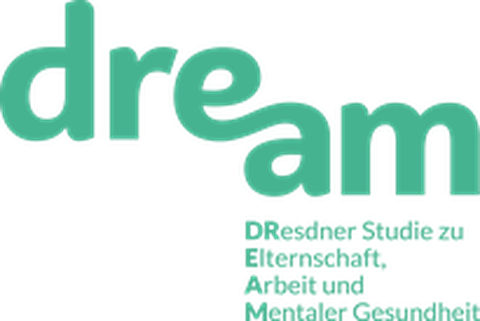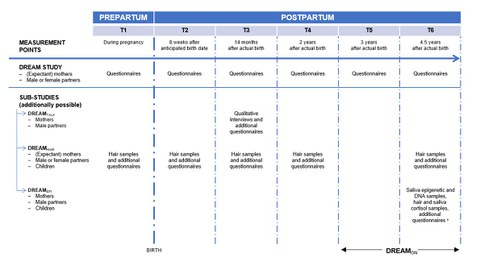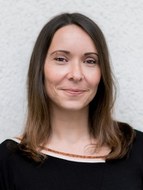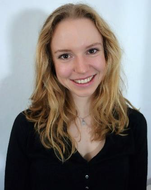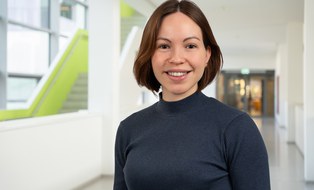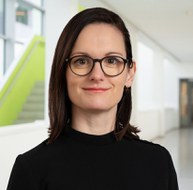DREAM - Dresden Study on Parenting, Work and Mental Health
Table of contents
DREAM
The compatibility of family and paid employment poses a great challenge for many parents. This interrelationship may be influenced by several structural and cultural factors, such as the German tax system, parental allowance, and the availability of day care. Moreover, these factors may influence the role distribution between mother and father. Increasingly precarious working conditions and professional commuting may represent additional burdensome factors. However, the role of paid employment and working conditions regarding mental and somatic health of young parents has hardly been researched in Germany.
Hence, the aim of our study “DREAM” (Dresden Study on Parenting, Work, and Mental Health) is to explore the prospective relationship between parenthood, work, and health of the whole family and to identify corresponding potential associations. Expectant mothers and/or their partners residing in the area of Dresden, Germany, can join this study. Covering a period of approximately 5 years, the participants are surveyed on work participation and conditions, housework and childcare, relationship satisfaction as well as health-related factors. The first questionnaire is completed during pregnancy, the following ones eight weeks, 14 months, 2 years, 3 years, and 4.5 years after childbirth.
In the DREAM sub-studies, we want to look at and understand the specific interaction between psychological, social, and biological aspects of our well-being. In addition to the questionnaire surveys, we also assess physical factors in some of the DREAM families using hair samples (DREAMHAIR) and/or saliva samples (DREAMEPI). In addition, some couples will be interviewed about their family situation and role distribution (DREAMTALK). In 2020, we also investigated the effects of the COVID-19 pandemic on families with young children (DREAMCORONA).
News about publications, lotteries, and other activities of the DREAM team can be found on our Facebook page or on twitter @GN_ResearchLab.
In addition to our published study protocol, you will find further publications on Public Mental Health here.
DREAMHAIR
In our sub-study DREAMHAIR, we are interested in how the body’s stress hormone system responds to the specific challenges during pregnancy and the time after birth. Further, we are interested in the consequences this may have for the well-being of all family members. Hair analysis represents an innovative method to measure long‑term stress hormone release (e.g., cortisol). Cortisol is an essential endogenous stress hormone enabling us to adapt to stressful situations. Hair retains cortisol, which only grows out slowly. Initial studies indicate this process already takes place in the womb. In other words, maternal stress load will probably be reflected in the baby’s hair cortisol even before the baby is exposed to external influences.
The aim of DREAMHAIR is to analyze how high the concentration of various stress hormones is in the hair of mother, father, and child at the first four as well as the sixth DREAM measurement points and which external factors have an influence on this concentration. In the future, this could make it possible to objectify family stress factors and derive preventive measures that are specifically adapted to the needs of young families.
DREAMEPI
In our substudy DREAMEPI we are interested in the child’s epigenome. The entire “blueprint” for our body is stored in our genes (at the level of our genetic material, the so-called DNA). Whether and in what form this information is read depends, among other things, on so-called epigenetic mechanisms, which can silence or activate genes. Previous research shows that several environmental influences during the time in the womb and shortly after birth can impact the offspring’s epigenome. For this reason, the substudy DREAMEPI investigates the extent to which parental general and work-related stress before and after birth is associated with childhood epigenetic changes and to what extent these changes influence the child’s health.
For this purpose, parents from DREAM and their 4.5-year-old children take part in a one-time test in our study laboratory. The collection of children’s saliva samples enables the detection of changes in the epigenome. Furthermore, saliva and hair samples are taken to determine stress-associated biomarkers (e.g. cortisol) and questionnaires are completed to collect information regarding psychological symptoms and general health.
The aim of the DFG-funded DREAMEPI substudy is to better understand the molecular pathways underlying the fetal origins of health and disease, which could contribute to the development of evidence-based prevention strategies in the long-term.
DREAMTALK
There are different ways to divide the tasks of work, childcare and household between the parents. One possibility is the 50/50 family model. This means that both parents take on an equal amount in these three areas. Couples who shared work and household responsibilities 50/50 before the birth of their child often find it challenging to maintain this model after the birth, even if they would like to. Many return to more traditional roles. Thus, couples who implement a 50/50 family model are a minority. We asked these couples in the DREAMTALK sub-study using qualitative interviews: "Why do you want to implement a 50/50 family model?"; "What strategies do you use to equally share the tasks of work, childcare and household?"; "How are you doing with the 50/50 family model?"
With the knowledge generated within DREAMTALK, family policy action can be improved in order to support parents more adequately in the future.
DREAMCORONA
In spring 2020, two more sub-studies (DREAMCORONA und DREAMCORONA-TALK) were developed to investigate the experiences and effects of the COVID-19 pandemic (e.g. isolation, school and daycare closures) on family health and relationships. These factors were assessed using two online questionnaires five months apart (May to July 2020 and October to December 2020). At the first time point, 1,055 people (61.4% of whom were mothers) participated. Seven participants were also interviewed once about possible changes in distributions of roles and tasks due to the COVID-19 pandemic (DREAMCORONA-TALK).
Media reports (German)
- Insights into our study results: Report of December 2023
- Insights into our study results: Report of April 2022
- Insights into our study results: Report of February 2022
- Insights into our first study results: Report of August 2020
- Interview in the Bärenstark-Talk - 16.08.2022 Arbeitsteilung im Familienalltag
- Interview with study leader Prof. Dr. Garthus-Niegel - 20.03.2020: "MDR aktuell"
- Report in the "Sächsische Zeitung" - 19.03.2018: "Zwischen Baby und Büro"
- Report in the DFG magazine - 14.03.2018: "Arbeit und Familie"
Study leader
Study team
Scientists
Cooperation partners
Further team members
| Debora Elliesen | Medical PhD student |
| Elena Wulf | Medical PhD student |
| Eric Handtke | Medical PhD student |
| Esther Hutloff | Medical PhD student |
| Franziska Mörsch | scientific research assistant |
| Jennifer Mann | Medical PhD student |
| Jenny Ellen Wolf | Master student |
| Josefine Simm | Medical PhD student |
| Julia Manderscheid | scientific research assistant |
| Juliane Bahlmann | Medical PhD student |
| Leonie Sarah Stumpf | Medical PhD student |
| Lilith-Sophie Lange, M.Sc | PhD student |
| Marlene Karl, M.Sc. Psych | PhD student |
| Paula Reschke | student research assistant |
| Pauline Bart | Master student |
| Sabrina Reis | Master student |
| Sara Buschbeck | student research assistant |
| Tirza Patella | Medical PhD student |
| Victoria Weise, M.Sc. Psych | PhD student |

